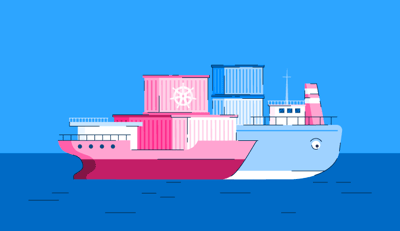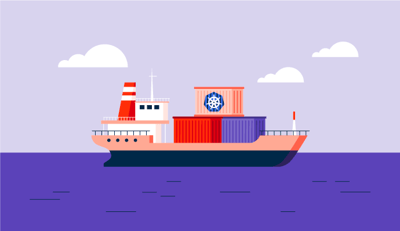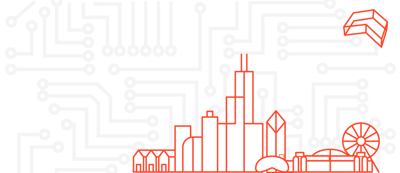December 19, 2017
 by Aaron Walker / December 19, 2017
by Aaron Walker / December 19, 2017

Container tools are popping into company stacks, or lists of software used at a company, all over the place.
They’re replacing virtual machines worldwide, and the market is expected to grow from $762 million in 2016 to nearly $3 billion in 2020.
They’ve finagled their way into tons of tech markets and will play a growing role in microservices and continuous delivery practices. WIRED says they’re bringing tech giants together; ZDNet asked why they’re “so darn popular.”
Before we start, a lot of people are still asking, “what are containers?” They are self-contained, resource-isolated applications with a virtualized operating system. That means companies can mix and match containers, connect to other companies’ public containers and optimize network efficiency. The plug-and-play nature of containers makes them flexible in functionality and gives administrators more control over resource allocation and scaling.
While Docker, a popular Linux container and management system, still dominates the market, orchestration tools, such as Kubernetes, and networking tools, such as Weaveworks, are gaining traction. The cool thing about containers is that many tools across categories can be utilized together.
It’s no wonder containers are becoming a lynchpin for the internet’s industry leaders. Because in a containerized world, the sum is truly greater than its parts.
| Please note: "Other products in [company]'s stack" refers to software solutions reviewed by users whose LinkedIn profile says they work at the aforementioned company. |
If you’re considering container adoption, it will help to understand other companies that are using them and how they are utilizing products in the container ecosystem.
Here are a handful of cool tech companies, listed alphabetically, whose employees have reviewed container tools on G2 Crowd, along with a few other interesting components of their stacks.
Acquia is a cloud-based web content management system provider which offers services atop the open-source Drupal framework. It has a few offerings but focuses on providing a quality digital experience to a customer’s user base.
It’s been around for a decade and was quickly named a top-10 company on Inc.com’s 5000 rankings. Acquia has received a ton of other awards and has more than 3,500 global customers.
Users working at Acquia have indicated they use SignalFx for container monitoring. SignalFx can be used to monitor networks, applications and containers, and assist with log analysis. The tool was invented by Facebook, Google and VMWare alumni in 2013 and has quickly grown in popularity.
“Since adopting SignalFX, we haven't seen any noticeable downtime events or impactful service interruptions, the company is responsive to feature requests and bug reports, and our own teams love the functionality of the SignalFX site.” — SignalFx review
AWS is a behemoth known by anyone and everyone working in tech. It has nearly one-third of the cloud infrastructure market share, and its growth doesn’t show signs of slowing down.
Amazon has 100 products listed on G2 Crowd, and that’s not even all of them. It’s tough to keep up with new products the tech giant offers nearly every month.
AWS S3 and EC2 are its most-reviewed tools on G2 Crowd, falling in the infrastructure as a service (IaaS) and cloud platform as a service (PaaS) categories, respectively. But Amazon also offers a number of cloud databases and container tools, and myriad additional tools.
Aside from Amazon’s own container tools, which they probably use, an employee reviewed Docker, the most common container tool we’ll mention today.
AWS is so large, it could use containers for virtually everything from managing microservices to application development. On December 4, it announced a new feature that allows AWS container to run on bare metal.
“Reducing deployment friction is the chief benefit. The advent of the Cloud allowed us to break away from physical servers and rapidly develop our products and services. Docker adds a Saturn 5 rocket to that.” — Docker review
AppDynamics is an application performance monitoring (APM) solution which can be used to monitor containerized applications. An AppDynamics employee reviewed Kubernetes, a popular open-source orchestration tool.
Kubernetes fluctuates between a Niche tool and a Contender on our APM Grid®, but still averages 4.3 out of 5 stars on 19 reviews, 6 of which are for container monitoring.
The company itself is approaching its 10th birthday in 2018 and has definitely made a name for itself, notably placing as a top-10 company on Forbes Cloud 100 list in 2016.
The company was also acquired by Cisco in January 2017 for $3.7 billion. Its site advertises more than 1,500 customers including large corporations like eHarmony, Expedia and Citrix.
While the company can monitor containers on its own, it likely uses Kubernetes to manage its own application clusters. AppDynamics published a comparison of a few container management tools.
“Best for APM, content cloud monitoring, large scale business like ours and giving regular alerts, business health and critical analysis for all our products and the status updates are really worth it, UI complexity is trimmed down and ideal for docker monitoring, pings and service monitoring.” — AppDynamics review
DigitalOcean is a cloud infrastructure provider in our IaaS and virtual private server (VPS) categories. The company was founded in 2011 and provides a range of cloud services, from hosting to networking.
It has 136 reviews and was named a Leader in our Fall 2017 Grid® for Infrastructure as a Service. It had the highest satisfaction score in the report, but placed second overall because of AWS’s market presence.
A DigitalOcean employee reviewed Docker, which can actually be used to provision hosts atop the DigitalOcean platform. This can help require security credentials or run sandboxes in Docker containers to flag potentially risky access requests.
Many people likely run their containerized applications on DigitalOcean infrastructure. If you’re curious about running Docker with DigitalOcean, the company published a guide. But DigitalOcean could use it during its development processes and to help manage integrations.
“Some of my setups are now a hundred times easier to run. Deploying is quicker, workflow makes more sense, isolated services are easier to organise, and I can get more out of less with the efficiency Docker provides.” — Docker review
Fuze is a cloud communication platform used to enable business voice, video conferencing and sms messaging within applications. The tool has 25 reviews in our web conferencing category and is currently rated as a Niche product in the category.
It has been around for a little over a decade but has gained a lot of attention recently, especially with its top-20 rating on 2016’s Forbes Cloud 100 list. In February, it announced a $104 million funding round, raising its total funding to more than $300 million.
A Fuze employee reviewed AppNeta, a container monitoring, network monitoring and APM solution. The tool can help users continuously monitor application performance and end-user experience.
Fuze published a blog describing its use of containers during its devops process. It helps them quickly build applications and package them, though Fuze does describe a few issues regarding some container failover.
“I like the features and functionality as well as the easy to use web interface. [We use it for] solving over-utilization and/or firewall issues as well as voice quality issues.” — AppNeta review
Everyone knows Google, but not everyone knows about its cloud offerings. Google provides services for everything from big data processing and machine learning to PaaS and DevOps management.
Google’s most-reviewed product is the Google App Engine which has 58 reviews in our PaaS category. It’s currently rated as a Contender in the category and averages 3.9 out of 5 stars.
One employee from Google reviewed Helios, a Docker orchestration framework that enables continuous delivery. It’s part of Spotify’s free software projects which includes tools for Docker, Cassandra and Java development, among other things.
Google created Kubernetes and provides numerous container services, including a cluster management tool and a container registry to store docker images. Google was ahead of the crowd, according to a report by The Register in 2014 claiming, “everything at Google runs in a container.”
“I love how easy it manages containers that I need to spread across an entire fleet of servers and mounts. Had issues keeping up to date with our changes and this keeps a very thorough live record.” — Helios review
Infosys is an enormous multinational corporation from India. It’s the second biggest Indian IT company in the world. It provides business consulting, information technology and outsourcing services
Infosys currently has two reviews in our IT Strategy Consulting category, but that doesn’t really demonstrate its global influence. Infosys has billions in annual revenue and was named the 19th most innovative company in the world by Forbes.
Two of its quarter-million employees reviewed container tools on G2 Crowd. They discussed using AppDynamics, which I described earlier with AWS, and PagerDuty, a container monitoring and DevOps tool.
Infosys wrote about the benefits of containerization and its partnership with the Cloud Native Computing Foundation (CNCF). It describes the ways in which containers reduce the complexity of integration and make it significantly easier for enterprises to adopt cloud native technologies.
“[I like the] Integration features with our existing corporate apps, automated acknowledgement and resolution if required and Incident management.[I am] able to remove human interference and receive automated calls. [There’s] No baby sitting.” — PagerDuty review
Intel is one of the biggest technology companies in the world and has been for nearly 50 years. It has billions in annual revenue and more than 100,000 employees worldwide.
Intel has seven products listed on G2 Crowd in a range of categories that include data security, network monitoring and password management. Most of its income, though, comes from producing memory solutions and data centers.
One of Intel’s employees reviewed Kubernetes. The only things I haven’t mentioned yet about Kubernetes is the fact it was created by Google. It was later donated to the Cloud Computing Foundation, and is now distributed by companies including Redhat, IBM and Oracle.
This year, Intel launched a new version of Clear Containers, a tool used to improve application scalability. The tool uses OCI as a runtime and runs on Kubernetes. The feature aims to benefit users by reducing startup time and reduce memory overhead.
“It's lightweight compared to other "cloud" APIs, you can easily change scheduler behaviour. We are solving scheduling problems depended on the hardware information. based on that we are going to influence k8s scheduler or mesos scheduler.” — Kubernetes review
Juniper Networks is a billion-dollar, publicly traded company specializing in security and networking technology. It has expanded its offerings from core routers to routers, switches, firewalls and container management.
Juniper Networks has seven products listed on G2 Crowd, and Juniper Security has the most reviews with seven. It’s a network security tool used to control threats and secure access based on a variety of user characteristics.
A Juniper Networks employee reviewed Cloud 66 for Containers, a container management solution. The company offers a variety of DevOps solutions for containers, Rails and Node.
The company published a blog describing how to build a network using containerized applications. It describes the ways in which containerization improves agility and efficiency for development teams.
“Cloud 66 puts web-scale ops capabilities into the hands of developers for those organizations who may lack their own ops resources. I've been using Cloud 66 and have been recommending Cloud 66 to dozens of organizations over the past 3 years.” — Cloud 66 for Containers review
Lucid Software is a provider of SaaS solutions for wireframing/prototyping and web design. The company was started in late 2010 by a college student and has since grown to nearly 300 employees.
Lucidchart is incredibly popular and has 206 reviews across our Diagramming and Wireframing categories. Lucidpress has 55 reviews in our “Other Design” category since the unique tool doesn’t necessarily fit into any of our more defined categories.
Datadog is a monitoring solution used for APM, network and container monitoring. Its 45 reviews earned it High Performer honors in our Summer 2017 Grid® for Application Performance Monitoring.
Lucid Software likely uses the tool to monitor the performance of containerized web applications. Employees could easily identify when connections fail and performance is slowed, and track the effects of application updates.
“We needed a robust, versatile solution to track a variety of metrics like number of errors, load and response times, job execution stats, db connection usage, track runs of scheduled tasks etc. Datadog allowed us to implement all of that with one tool.” — Datadog review
MapR is a software company that provides big data solutions for Hadoop and spark clusters. The company has received nearly $300 million in funding since launching in 2009. The most recent round was in September of 2017 with $56 million from a combination of seven investors.
MapR is a big data processing and distribution tool platform that supports a range of mission-critical and real-time production uses. It currently has only one review from a user that called it “an extremely powerful Hadoop distribution” tool.
One of MapR’s employees reviewed Docker and gave it a five-star rating. The only thing they didn’t like was the lack of dashboards and hoped for expanded deployment functionality.
Container tools like Docker could benefit MapR by simplifying integration processes. Containers make it easier to securely manage data in transfer. Employees could also virtualize data centers for information storage and access.
"We have been deploying microservices and using modern concepts like hysterix which enables dampening of services in the case of failure. Docker is a very natural way to handle such scenarios.” — Docker review
Mendix is a SaaS provider of rapid application development tools that was founded in 2005. Since then, it has grown to more than 350 employees and 3,400 customers, and it has received $38 million in funding.
Mendix’s product has 16 reviews and is listed in our PaaS and low-code development platform categories. Companies can use the tool to quickly build applications with minimal coding to work cross-functionally and simplify business processes.
A Mendix employee reviewed GitLab, a web-based Git repository manager with an integrated container registry for storing Docker Images. GibLab was added as a standard feature in 2016 and can be used to directly integrate Docker files.
Containers could make it easier to update and integrate applications. GitLab has built-in continuous integration tools which would allow Mendix to update applications without impacting performance.
“Our company uses Mendix to empower customers to digitize their business model and innovate in the digital realm by providing new, unique and competitive features. So far I have participated in three projects for three separate customers. For all of them, we have been able to deliver beautiful and functioning apps in record times.” — Mendix review
Tesla is changing the way we look at transportation. It developed the first production automobile to use a lithium-ion battery in 2008, and it continues to expand its share of the automobile market.
The company, run by Elon Musk, was started in 2003 and went public in 2010. Before that it had received more than $350 million in funding. Today, the company has a market cap of $51.29 billion.
Tesla employees reviewed GitLab and Docker. The Docker reviewer rated the product five stars and the only thing they disliked was its command-line setup. The GitLab reviewer said the product was a straightforward lightweight source-control tool.
Docker could help Tesla manage applications for developers programming software components into a car’s internal computer. It could also help store applications and data within the vehicles.
“[We solved the issue of] needing to set up a machine development environment from scratch each time. [Docker is a] Super time saver in this case! This is great for on boarding new employees, but also to create sandbox environments.” — Docker review
Twilio is a SaaS provider which launched in 2007. The company had an IPO in 2016, but before that it received more than $230 million in funding. Today, the company is valued at $2.39 billion.
The company has two products listed on G2 Crowd, Twilio and Authy. Twilio is the highest-rated tool in our Cloud Communication category and Authy is the third-highest rated product in our Multi-Factor Authentication category.
One Twilio employee reviewed PagerDuty, which I mentioned earlier with Infosys. But some more interesting information of note could include its 9,500 customers which include eHarmony, Okta and Airbnb.
Twilio Proxy is a feature launched this year. It allows users to create a proxy service that acts as a container to mask and secure communications. It can increase security and efficiency while transferring data.
“[I like] the predictability in ensuring the right resources are engaged at the right time, transparency in terms of on-call/pager pain (noisy services), integration with third party monitoring and BI solutions and support received from PagerDuty support and executive teams.” — PagerDuty review
There are obviously more companies using container technology, but not all of their employees have reviewed tools publicly on G2 Crowd. Some companies displayed on Docker’s site as customers include Microsoft, IBM and Cloudera.
The list will only continue to grow for many of the products listed above as the expected market growth occurs, so keep an eye out if you’re an investor or are simply interested in emerging technologies.
If you use container software or are curious about new technologies, visit our containerization software categories to learn more and review tools.
* Please note: Reviews have been edited for spelling and grammar.
Aaron has been researching security, cloud, and emerging technologies with G2 for more than half a decade. Over that time he's outlined, defined, and maintained a large portion of G2's taxonomy related to cybersecurity, infrastructure, development, and IT management markets. Aaron utilizes his relationships with vendors, subject-matter expertise, and familiarity with G2 data to help buyers and businesses better understand emerging challenges, solutions, and technologies. In his free time, Aaron enjoys photography, design, Chicago sports and lizards.
If you're new to the world of containers, Kubernetes and Docker are two terms you've probably...
 by Samudyata Bhat
by Samudyata Bhat
Kubernetes has experienced tremendous growth in its adoption since 2014. Inspired by Google's...
 by Samudyata Bhat
by Samudyata Bhat
It’s no secret that an increasing amount of companies are choosing to call Chicago home.
 by Deirdre O'Donoghue
by Deirdre O'Donoghue
If you're new to the world of containers, Kubernetes and Docker are two terms you've probably...
 by Samudyata Bhat
by Samudyata Bhat
Kubernetes has experienced tremendous growth in its adoption since 2014. Inspired by Google's...
 by Samudyata Bhat
by Samudyata Bhat


